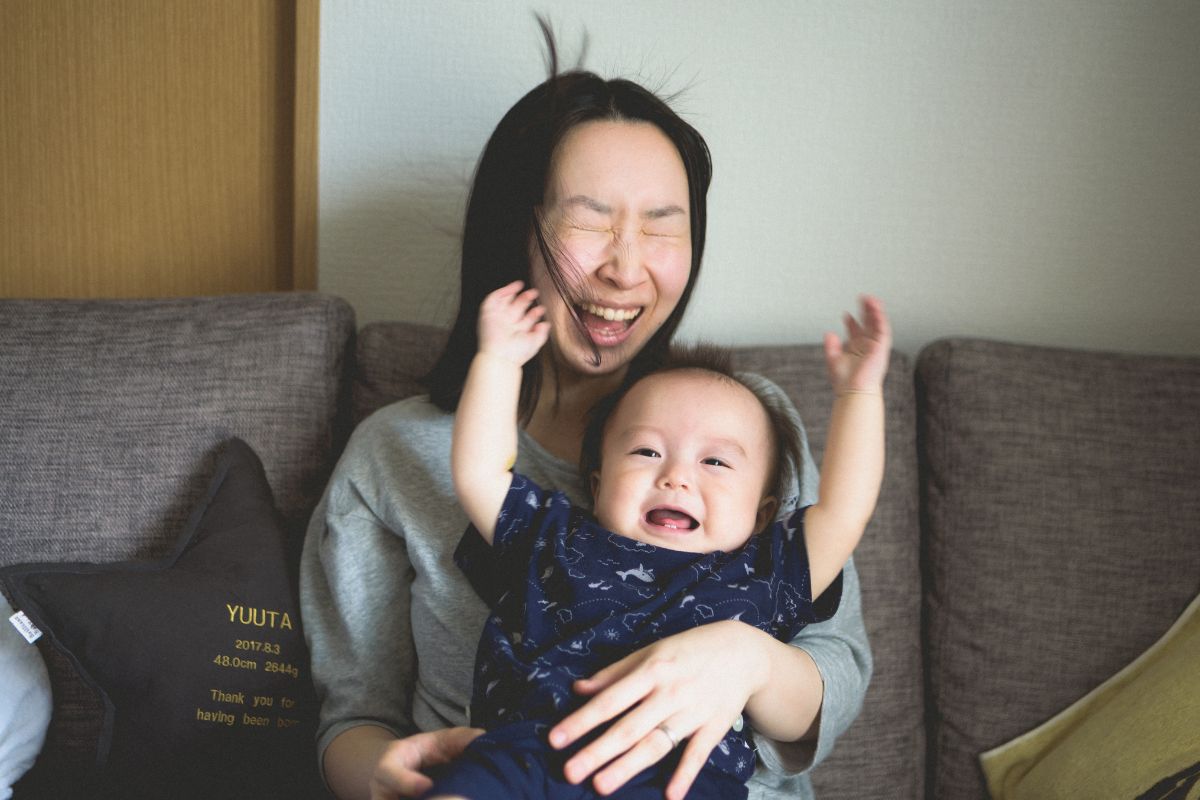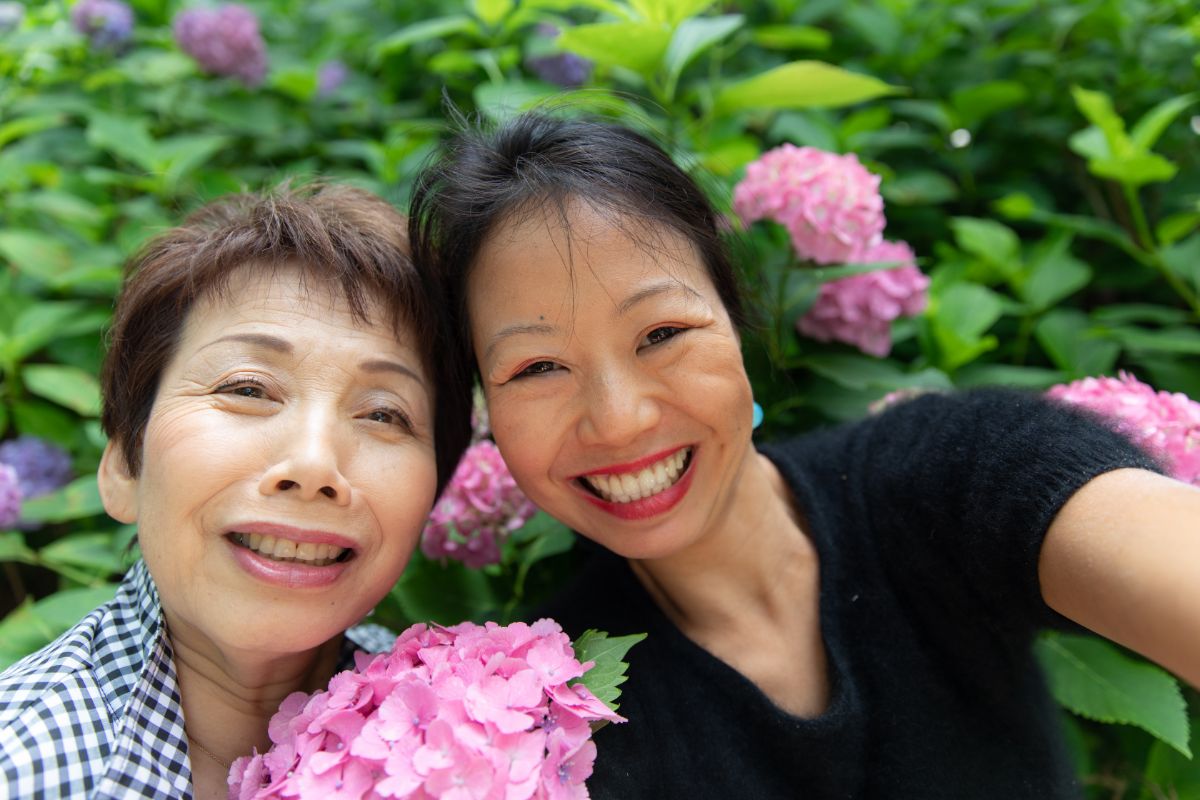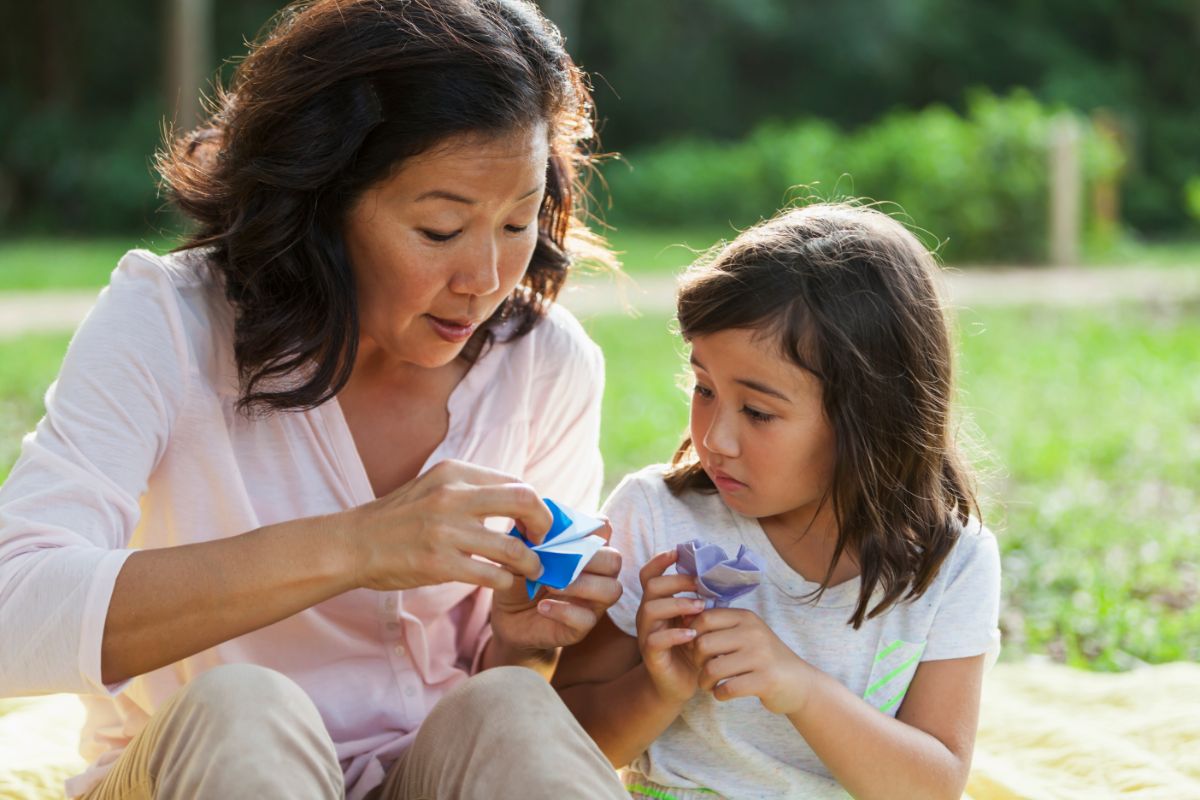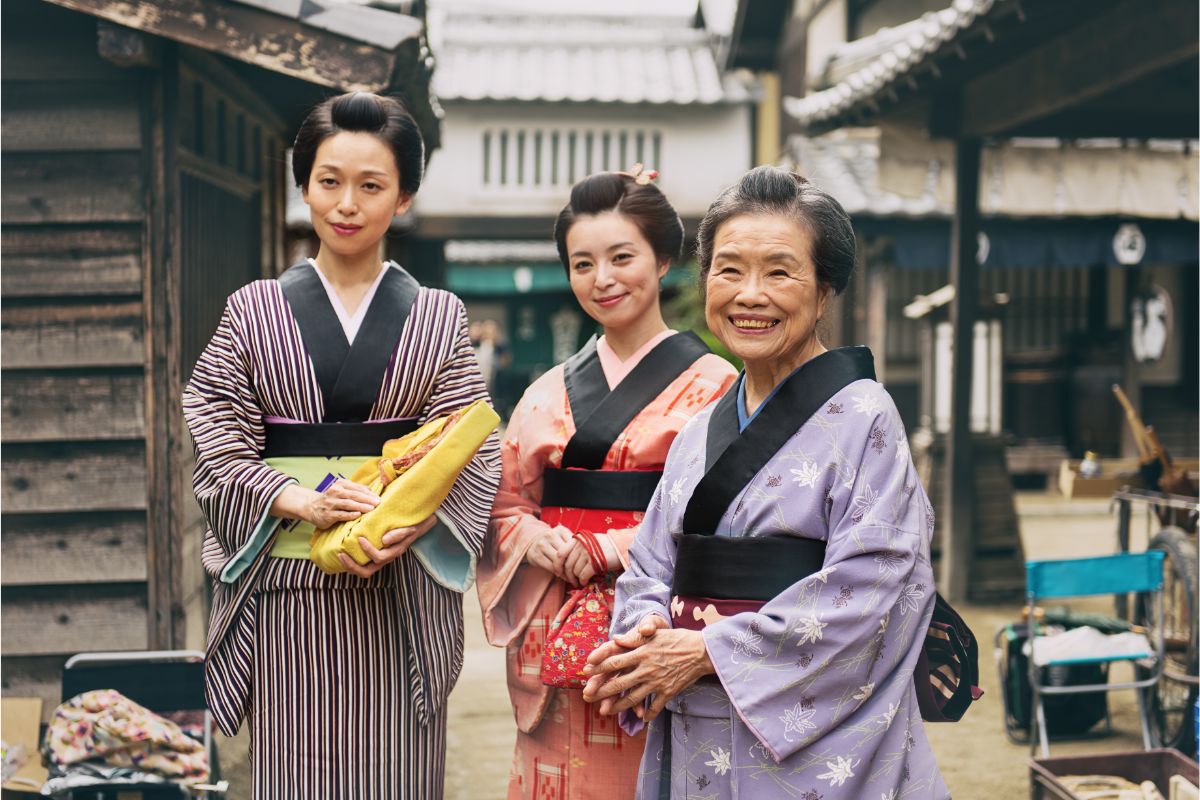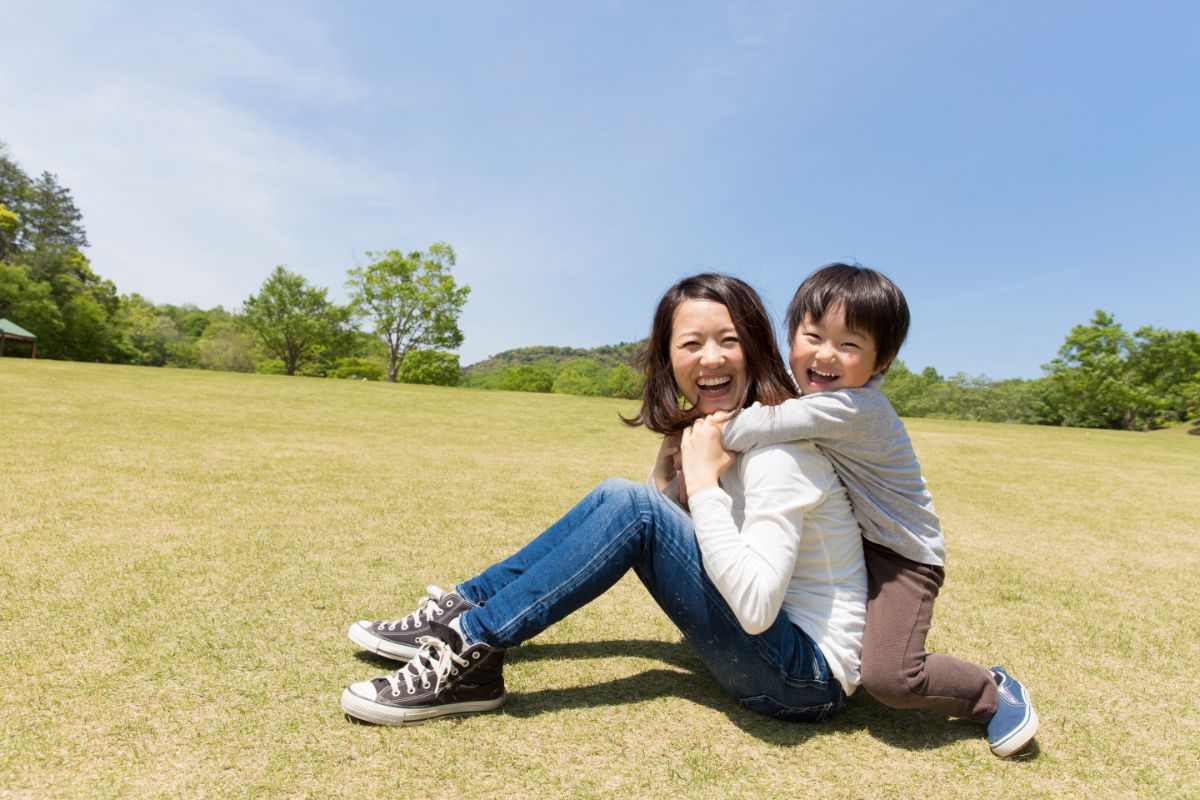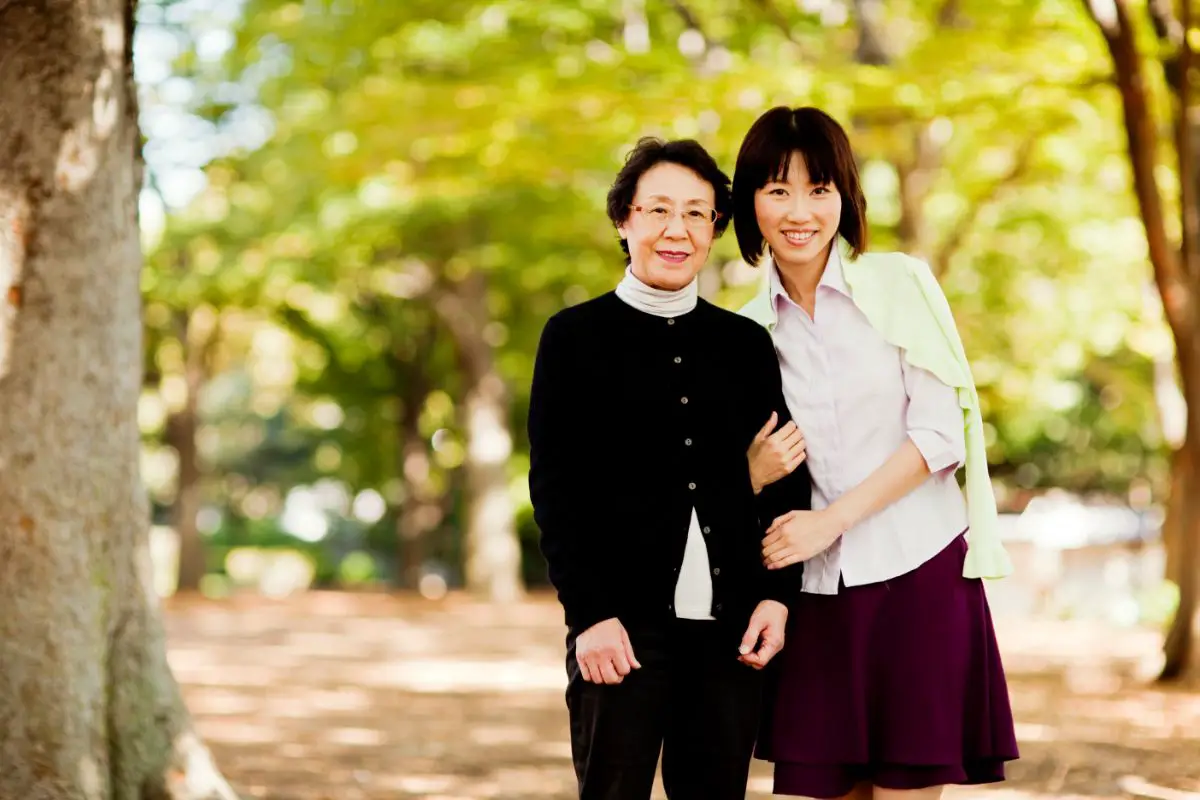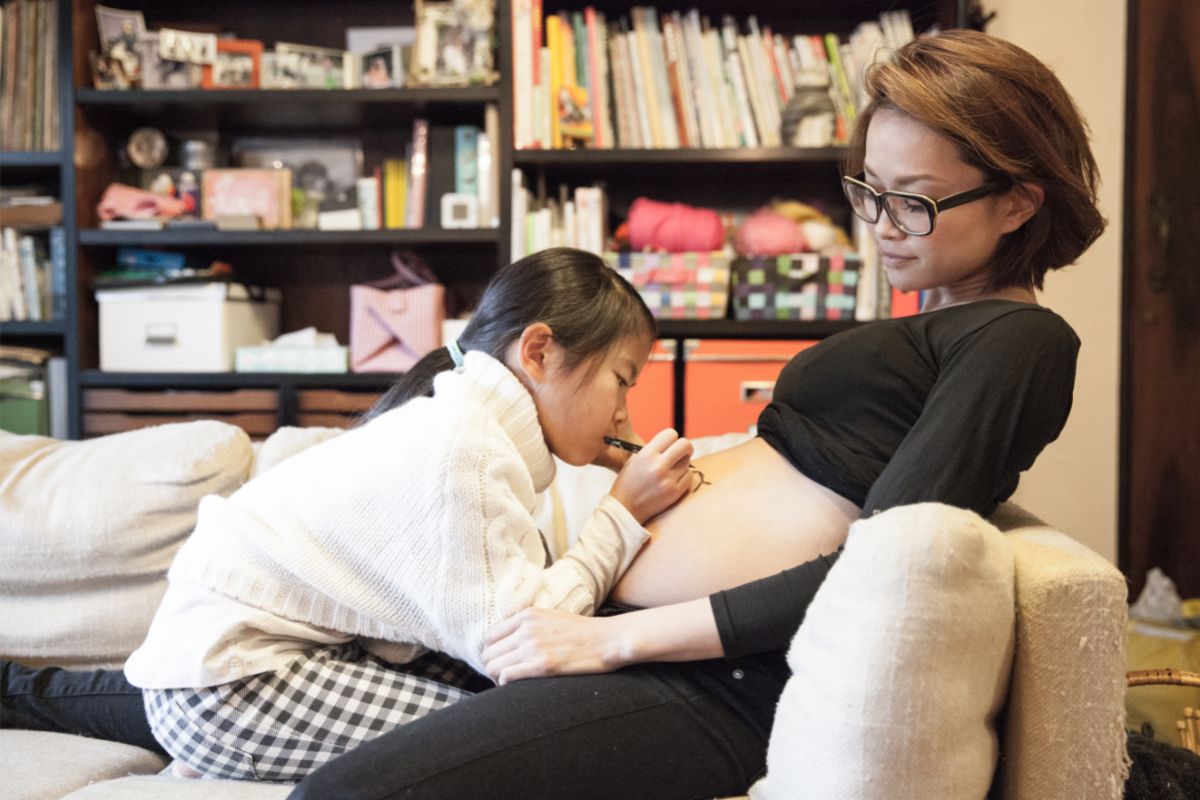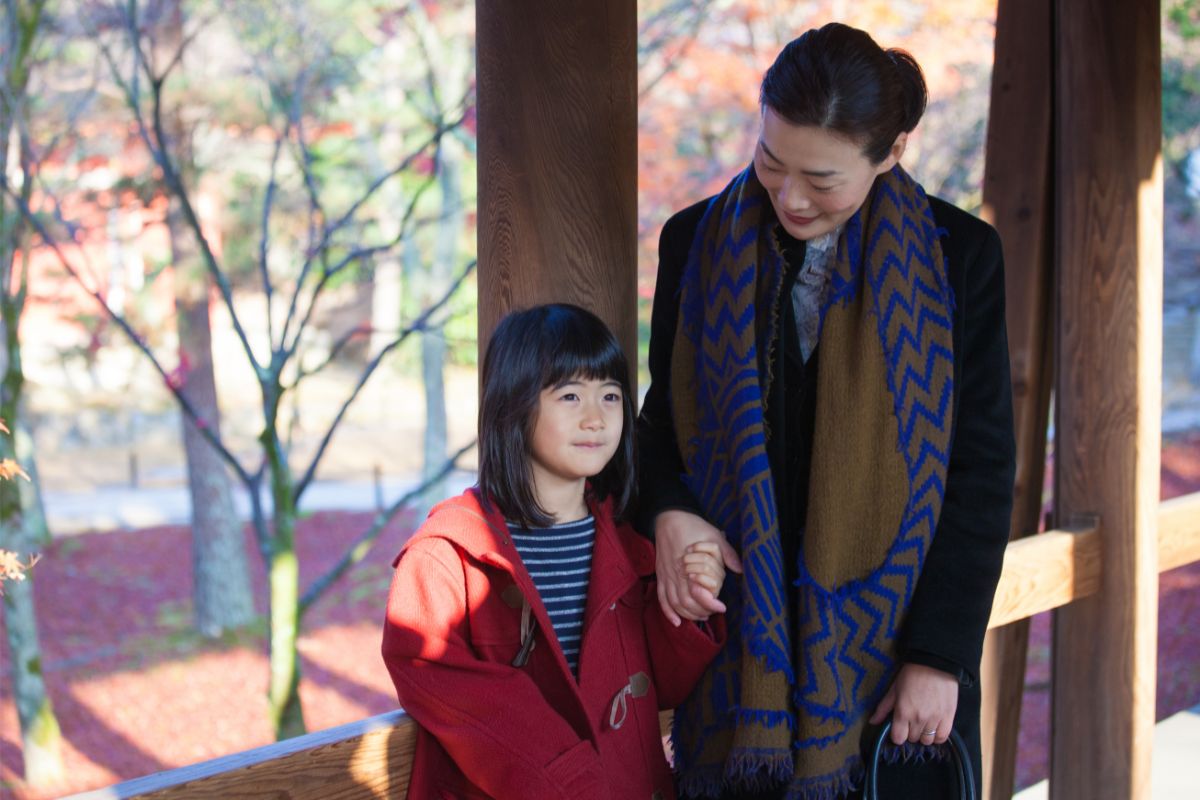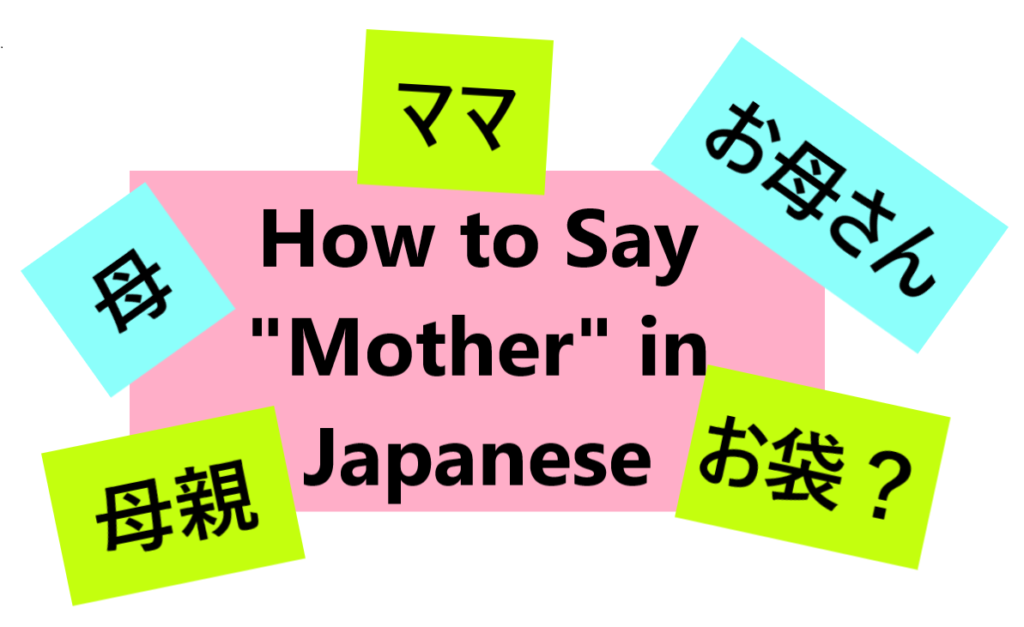The “general” Japanese word for mother is お母さん (okaasan). However, there are many different ways to say mother in Japanese, depending on who you are talking to. Knowing the right word to use can be complicated, but are ways to learn Japanese quickly and easily. Let’s take a look at the different ways to say mother in Japanese naturally.
1. お母さん (Okaasan)
お母さん (Okaasan) means “mother” in Japanese. Its kanji, 母, represents a nursing mother. There are two general ways お母さん is used:
- When you’re referring/talking to your own mother.
- When you’re talking about someone else’s mother.
Some children will call their mother’s お母ちゃん (okaachan) instead of okaasan. There are some people who drop the お (o) from okaasan and call their mothers 母さん (kaasan). Adults sometimes use these words when they want to show endearment to their mothers. Regardless, okaasan is undoubtedly the most common and pliable way to say mother in Japanese.
Examples:
1. お母さん!俺の靴はどこにあるか知ってる?
(Okaasan! Ore no kutsu wa doko ni aru ka shitteru?)
Mom! Do you know where my shoes are?
2. あなたのお母さん、元気にしてる?
(Anata no okaasan, genki ni shiteru?)
How’s your mother doing?
2. 母 (Haha)
母 (haha) is the humble word for mother in Japanese. If you were to talk about your mother (to people outside of your family) in a formal situation, haha is the word you’d use. Because this is humble Japanese or 謙譲語(kenjougo), it’s rude to refer to other people’s mothers as haha. Only use this word when you talk about your mother.
Example:
1. 私の母は和食を作るのが好きです。
(Watashi no haha wa washoku o tsukuru no ga suki desu.)
My mother enjoys cooking Japanese food.
3. お袋 (Ofukuro)
The word お袋 (ofukuro) is a less formal way to refer to your mother when speaking to others. Some have posited that ofukuro is not culturally or grammatically “correct,” but the word has still become commonplace. You can use ofukuro either in formal settings or around your friends. It’s even possible to call your friends’ mother ofukuro, so long as you add -san.
Example:
1. このおにぎり、お袋さん作ったの?めっちゃ美味しい!
(Kono onigiri, ofukuro-san tsukutta no? Meccha oishii!)
Did your mother make these rice balls?
4. 母親 (Haha Oya)
母親 (haha oya) is a broader term for mother in Japanese than the previous words. Haha oya refers to any female that has had children.
This could technically mean a human mother or another type of animal. Haha oya shouldn’t be used to call your own mother, as it would feel cold and distant. It is possible to use it to refer to the mother of someone to whom you’re speaking, but if you want to play it safe, お母さん (okaasan) will work for most situations. Haha oya should be used for the third party only.
Examples:
1. あの赤い帽子を被っている子、母親に叱られたね。
(Ano akai boushi o kabutteiru ko, haha oya ni shikarareta ne.)
That boy in the red hat was just scolded by his moth
2. 小熊はかわいいけど、母親は危険だ。
(Koguma wa kawaii kedo, haha oya wa kiken da.)
Bear cubs are cute, but their mothers are dangerous.
5. ママ (Mama)
The word ママ (mama) is used by little children in Japan to refer to their mother. It has the same nuance as the word “mommy.”
Like okaachan, the word mama may be used by adults as a term of endearment. However, the nuance of mama is more childish. You definitely wouldn’t want to refer to your mother as mama in adult company.
Example:
1. ママ、アイス食べたい!
(Mama, aisu tabetai!)
Mommy, I want ice cream!
6. おかん (Okan)
おかん(okan) originates from the nationally beloved Osakan dialect. However, the term spread and is now common in all prefectures of Japan. Okan is a pet name for mother in Japanese.
Think of it as the English equivalent to mom, mama, or mommy. The nuance to okan is a bit less childish than that of mama; however, it’s still most common among middle and high school students. Adults wouldn’t use the word okan in public or formal settings.
Example:
1. 俺のおかんが昨日、ビーフシチューを作ってくれた。最高だった!
(Ore no okan ga kinou, biifu shichuu o tsukutte kureta. Saikou datta!)
My mama made beef stew last night; it was awesome!
7. 御母堂様 (Gobodou-Sama)
御母堂 (gobodou) is an extremely formal way of referring to someone else’s mother. Gobodou is 尊敬語 (sonkeigo)or respectful Japanese. More often than not, the suffix 様 (-sama) will be affixed at the end.
Gobodou is an uncommon word. It’s mostly used in formal writing, such as in a letter or an invitation. You’re most likely to find gobodou in situations like a letter announcing the death of someone’s mother or in a letter of condolence given at the funeral.
Example:
1. 御母堂様の御逝去に対し、心よりお悔やみ申し上げます。
(Gobodou-sama no goseikyo ni taishi, kokoro yori okuyami moushi agemasu.)
I offer my heartfelt condolences for your mother’s death.
8. 母上(Haha Ue)
Technically, 母上 (haha ue) is getting to be an obsolete term. It’s origins are unclear, but it appeared in a book of poems in the Heian Period (794-1185). Haha ue was often used by samurai families. It means mother in archaic Japanese.
While you wouldn’t call your own mother haha ue, you will definitely hear the word if you ever watch a samurai film in Japanese.
Some Japanese people call their mothers haha ue as a joke, but there are some people who use it normally to refer to their mother. Whether you like period films or just want to make your host mother smile, haha ue still has its uses.
Example:
1. 母上!申し訳ございません!
(Haha ue! Moushi wake gozaimasen!)
Forgive me, O my mother!
Conclusion
There is a multitude of ways to say mother in Japanese. However, you can’t go wrong with the standard, “お母さん (okaasan)” for most situations.
How do you say mother in your language? Let us know in the comments! Thank you for reading!
Team Japanese uses affiliate links. That means that if you purchase something through a link on this site, we may earn a commission (at no extra cost to you).
The standard Japanese word for mother is okaasan (お母さん / おかあさん). This word is typically used when speaking to your own mother or talking about somebody else’s mom. But did you know that there are many ways to refer to mothers in Japanese?
Other words like haha (母 / はは) and haha oya (母親)are used in completely different situations than when we use okaasan! Even the ancient samurai had a unique (and very honorable) way of addressing mothers.
Why is this so? Respect and politeness is a huge factor in the Japanese language, especially when talking about family and people outside of the home. Depending on the situation or context, there will always be an appropriate word.
- Okaasan
- Haha
- Mama
- Okaachan/Kaachan
- Haha oya
- Haha ue
- Okan
- Ofukuro
お母さん
Mother (polite)
This is the standard, polite word for mother in Japanese. Okaasan is used when speaking to your own mother. This is also the proper way to refer to somebody else’s mother when you talk about them.
Examples:
Speaking to your own mother:
Okaasan, neechan ni ke-ki wo taberaremashita!
お母さん、姉ちゃんにケーキを食べられました!
おかあさん、 ねえちゃん に けーき を たべられました!
Mom, big sister ate my cake!
Talking about somebody else’s mother:
Yumi-san no okaasan wa ryouri ga jouzu desu.
ゆみさんのお母さんは料理が上手です。
ゆみ さん の おかあさん は りょうり が じょうず です。
Yumi’s mom is good at cooking.
Using okaasan shows respect, both to your own mother and someone else’s. O (お) is added at the beginning to make a word more polite, while -san (ーさん) is used as an honorific to refer to another person.
In a very formal situation however, the variant okaasama (お母様 / おかあさま) can be used. This is a form of sonkeigo or honorific language.
For sons and daughters-in-law, it is common to refer to their mother-in-law as okaasan also. The only difference is that the kanji for ‘mother-in-law’ (お義母さん) is different from the one used in ‘mother’ (お母さん).
Haha
母
Mother (humble)
The word haha (母 / はは) is another Japanese word for mother. This is humble in form because it is used when talking about your own mother to other people. It is rude to refer to somebody else’s mother as haha, so the safer route is to use okaasan in such situations.
Example:
Kinou haha wa Yokohama kara kaerimashita.
昨日母は横浜から帰りました。
きのう はは は よこはま から かえりました。
My mother returned from Yokohama yesterday.
Sometimes, haha is used in more general contexts where the word mother appears, like haha no hi (母の日) or Mother’s Day.
Mama
ママ
Mom
The Japanese language contains many loan words from English. Mama is one of them, and as it is a more child-like word, it is typically used by children. It is also written in katakana (ママ).
When children grow older, they start addressing their mom as okaasan. However, adults can also use mama as a form of endearment, whether with their own mother or by a husband to his wife. Mothers can also refer to themselves as mama.
Okaachan/Kaachan
おかあちゃん / かあちゃん
Mommy
Okaachan (おかあちゃん) may sometimes be shortened to kaachan (かあちゃん). Just like mama, this word is more child-like in nuance. Little kids usually say this when speaking to their mother.
The suffix -chan (ーちゃん) is added when addressing children or someone you are very close to. It also implies affection for the other person.
Both okaachan and kaachan are commonly written in hiragana. And just like the case with mama, children are likely to start calling their mother okaasan when they grow older.
Haha oya
母親
Mother-parent
This Japanese word for mother refers to any female who has a child. Haha oya (母親 / ははおや) literally means ‘mother-parent’. The word itself is used when talking about mothers in general.
Haha oya can be used to talk about human mothers or even animal mothers. Say, in a nature documentary about a pride of lions, the lioness taking care of her cubs can be called haha oya.
Fun fact: The word oya (親 / おや) is also found in oyakodon (親子丼 / おやこどん), a dish which name literally translates to ‘parent-and-child rice bowl’! This is because the dish is made up of chicken topped with egg. Isn’t it an interesting wordplay?
Haha ue
母上
Mother (old-fashioned)
If you‘re a fan of period dramas or jidaigeki, then you might have heard this word before! Up until the Meiji era, the samurai or any person who is part of a noble household used haha ue to refer to mothers.
Ue (上 / うえ) means ‘above’ or ‘up’. This implies that the mother is spoken to with high regard or respect. Although this is an old-fashioned word and is rarely used outside of period dramas or samurai movies, some people use it in the present to lightheartedly joke around with their mothers.
Okan
おかん
Mom (Kansai dialect)
Kansai-ben or the group of Kansai dialects is one of the most popular dialects in Japan. The way they call their mothers is okan, which is a contracted form of okaasan or okaahan (おかあはん), the word for mother in Osaka dialect.
Though Kansai-ben refers to the dialect commonly spoken across the five prefectures of the region, Osaka dialect has the largest influence. This is said to be a more casual form of speech compared to the Tokyo dialect or ‘standard Japanese’.
Ofukuro
おふくろ
One’s mother
Ofukuro is a less commonly used Japanese word for mother, and is considered a colloquial term. This is a more masculine language and maybe be used among friends or in formal settings to talk about your own mother. To talk about somebody else’s mother, -san is added to be more polite.
A good way to use this word is ofukuro no aji (おふくろの味 / おふくろのあじ), which means ‘mom’s home cooking’.
Interestingly, the kanji for ofukuro (お袋) literally translates to ‘honorable bag’. Its origins are unclear, but nowadays, the word is typically written in hiragana.
So many words for mother in Japanese!
As you can see, there are many ways to say mother or mom in Japanese!
This might seem overwhelming, but just remember that we also have lots of words in English: mom, mommy, mother, parent… The key is to think about the context. Who is speaking, and who are they speaking to?
We hope this post helped to explain the differences! Now learn how to talk about your other family members in Japanese:
- How to Say Father in Japanese
- How to Say Sister in Japanese
- How to Say Brother in Japanese
- How to Say Daughter in Japanese
- How to Say Son in Japanese
- How to Say Husband in Japanese
- How to Say Wife in Japanese
Ready to take the next step in your Japanese language journey? Our recommended online course is JapanesePod101.

Thea Ongchua
Thea is a freelance content writer, currently majoring in Japanese studies. She likes to create art and draws inspiration from film and music. Thea was inspired to study Japanese language and culture by reading the literary works of Haruki Murakami and Edogawa Ranpo.
Oftentimes when we’re learning a new language, it isn’t the initial translation that we find difficult, but rather, when we realize that one single word can be spoken in several different ways.
This is often the case for Japanese, and it’s one of the reasons why it’s considered so difficult to learn.
The word ‘mother’, in Japanese for example, can actually be pronounced in 7 different ways. This can be a bit of a mind field for those who have just started learning.
But don’t worry, that’s where we come in. Below, we’ve compiled a complete guide that will show you each of the different ways that you can say this word.
To find out more about the different varieties of the word ‘mother’, as well as how to pronounce it, simply keep reading below, as we take a closer look.
The Different Ways To Say Mother In Japanese
Below, we’ve compiled a list of each of the different ways that you can say mother in Chinese. This list includes more formal varieties, as well as some more affectionate ones used between family members.
Keep reading below to find out more.
1. Okaasan お母さん
Now, let’s get started with the most common way of saying mother in Japanese. When you’re first learning Japanese, this is likely to be the first word that you learn for your mother.
It’s the most formal of all the ones on our list, and might not necessarily be used between families on a regular basis, but rather as a way of referencing your mother in conversation with others.
You can also use this word when you’re speaking to somebody else’s mother too. It is considered to be the ‘proper’ way to address your mother and other people’s mother in polite conversation.
We can also alter the levels of formality based on how we say this specific word. For example:
- Okaasan – More Formal
- Okaachan – More Relaxed
So, depending on the situation at play, you can alter the level of formality of the word simply by changing the ‘san’ to ‘chan’, the latter of which shows more affection.
2. Haha 母
If you’re looking for a more informal and relaxed way of pronouncing mother in Japanese, then this is the one most widely used all around the country.
Haha sounds just like laughter in English, and is meant to express affection and joy.
This word should not be used when referring to somebody else’s mother, as it could be seen as a sign of disrespect, Haha is reserved exclusively for your own mother alone.
You can also use it to refer to your own mother in conversations with others.
3. Ofkuro お袋
This is another extremely popular way of saying mother in Japanese, and you’ll very probably hear it quite often when you visit the country.
One of the most interesting things about this word is that it’s not actually considered to be grammatically correct in Japanese. It’s almost a kind of slang word that’s been so widely used that it’s now accepted.
Ofukuro is another informal variety of mother, and you would typically use it when speaking to other people about your own mom.
It’s absolutely fine to use it to describe your friend’s mothers too, and isn’t considered to be impolite in any way.
It can sound both relaxed and formal simultaneously, so whether you want to use it in more polite conversation, or informal conversation, this word is applicable for both of those scenarios.
4. Mama ママ
This word is used widely in Japan, and you’ve probably heard it being used a lot whilst you’ve been out and about. It’s the Japanese word for mother that sounds most similar to the one used in our language.
Mama isn’t a word that you’d typically hear uttered by adults however. Mama is something that very small children will use when referring to and speaking to their own mothers.
If we were to translate this word to one that we have in our own dictionary, it would probably be ‘mommy’.
This isn’t to say that adults can’t use this word in their own homes, and you’ll often find that people do if you speak to them about it.
But, you would probably never hear this word being uttered by an adult within the company of somebody who’s not a member of the family. It’s considered to be childish, to a certain extent.
5. Haha Oya 母親
Now, we’ve already spoken about how to say mother in an informal and relaxed manner with ‘haha’, ‘haha oya’ is simply an extension of this, and is pronounced in the same way.
This word is far more broad than haha however, and can essentially mean anybody in the world who has children and is female.
If you want to refer to somebody who is having children, or has children in a relaxed and informal way ‘haha oya’, is a perfect example of how you would do this.
What’s interesting about this particular word, is that the object you’re referring to in the language doesn’t even need to be a human mother.
That’s right, this world can be used to describe any kind of animal in the world who has children.
So, if for example you were referring to a dog who has just birthed a litter of puppies, it would be completely acceptable to use the word haha oya when referring to them.
But, because haha oya is used to describe other people’s mothers so frequently, this shouldn’t be used to describe your own mother.
If you were to use this word to describe your own mother, this could be considered impolite, and rather rude because it sounds more distant than the other variety of haha.
6. Okan おかん
You might not hear this word as widely used as others, but it is used frequently in Japan nonetheless. It originally started out as a part of the Osakan dialect, but it gradually caught on, and became popular all over Japan.
You wouldn’t typically use this one if you were referring to your mother when speaking to friends. It’s considered to be very informal, and is comparable to the one we mentioned earlier, mama.
Differently from mama however, it’s considered to be slightly less infantile, and you’d hear adults saying it more frequently than the latter.
7. Haha Ue 母上
Here we find another variety of the word haha, which is a common and informal way of saying mother in Japanese.
If you were to add ‘Ue’ on to the end of that word, giving you ‘Haha Ue’, this would then denote a more archaic form of the word.
Haha Ue isn’t used widely in Japan anymore, but previously was used widely by families when speaking to their mothers. It’s now what we would call in the English language, an archaism, or a word that simply isn’t spoken anymore.
Sometimes, if you watch a Japanese movie that’s been based in the past, you’ll find the word Haha Ue being spoken by the characters.
Final Thoughts
To sum up, there are lots of different ways to say ‘Mother’ in Japanese, each of which have differing levels of formality. Take a look at our list above to find the applicable variety for the social setting you’re in.
- Author
- Recent Posts
Hi, I’m Aura Ruggeri and I want to make sure that no one makes the same mistake that I did.
So, if you’re planning a trip to Japan anytime soon, do exactly that — plan! Read up on all of the amazing things to do here to make the most of your time. I can bet that you’ll still return home feeling like you could’ve explored much more.
There are myriad ways to say mother in Japanese, depending on context. These include:
- HAHA – 母
- Hahaoya – 母親
- Okaasan – お母さん お義母さん
- Okaasama – お母様 お義母様
- Ofukuro – お袋
- Okaachan or Kaachan – かぁちゃん
- MAMA – ママ
How to say mom in Japanese depends on context, situation, formality, and relationship between the speakers.
Let’s take a closer look at all the different ways to say mother in Japanese, how to write mother in Japanese kanji, and how these expressions are used differently based on context, formality, and relationship.
Haha 母
Though this looks just like the the word we use in English to express the sound of laughter, in Japanese. haha means mother.
How to write haha in Japanese kanji and hiragana
母 (はは)
How to pronounce “haha” in Japanese
In the Japanese language, words and expressions change based on context, formality, and relationship. Here, haha in Japanese has the nuance of meaning “my mother” or “our mother” when referring to one’s mother to people who are outside the family.
For example, Miki is talking to her friend Keiko. She mentions of her own mother. Typically, she would use the word “haha” to refer to her own mother, as follows:
母は先週京都へ行った。(Haha ha senshuu, Kyoto he itta.) “Last week my mom went to Kyoto.”
Haha can also simply mean “mother” when there is no other situational context.
母の日 Haha no hi
Mother’s Day
How to say “my mother” in Japanese
Sometimes, to further specify that the mother being talked about is mine or ours, we attach the phrase uchi no ( うちの) to convey the meaning of “our home/ours/inside.”
Example:
うちの母は映画が好きです。Uchi no haha ha eiga ga suki desu. My/our mother likes movies.
Using this uchi no add-on when referring to your own mother or other family member instead of just the word itself will make your Japanese more natural-sounding.
Hahaoya 母親
Another similar expression to haha is Hahaoya. Here, the main difference between haha and hahaoya is the nuance of the latter being one’s parent.
How to write hahaoya in Japanese
母親
The word hahaoya is written using the following two characters:
母 (はは – HAHA) – Mother
親 (おや – OYA) – Parent
We already know that HAHA means mother. The character OYA means parent. So the literal meaning of the kanji combination 母親 is “mother parent.”
How to pronounce hahaoya in Japanese
Hahaoya is used when referring to one’s own parent, but when referring to someone else’s parent, we would instead use the following expression.
Okaasan お母さん お義母さん
How to write Okaasan in Japanese kanji and hiragana
お母さん・お義母さん (おかあさん)
Notice there are two different ways to write Okaasan in kanji. The first, お母さん, is the conventional way, when referring to one’s own or someone else’s blood-related mother.
However, when writing to refer to one’s own or another’s mother-in-law, we write Okaasan as お義母さん.
How to pronounce Okaasan in Japanese
Okaasan is perhaps the most well-known way to say mother in Japanese. You may already know that in Japanese it is common to add the honorific -san after a name to express proper respect for the person to or about whom you are speaking.
Likewise, Okaa-san is a more respectful way to say the word mother. Thus, when talking to or about someone else’s mother other than your own, it is proper to use Okaasan instead of Haha or Hahaoya.
For example, Miki is again talking to her friend Keiko. This time, she wants to know how Keiko’s mother is doing, so she asks:
お母さんはお元気ですか。“Okaasan ha ogenki desuka.“ “Is your mother well?”
Also, depending on the level of closeness and formality within a family, a child might call his or her own mother Okaasan, like this example:
お母さん、ちょっと出かけてくるね。“Okaasan, tyotto dekakete kuru ne.” ”Mother, I’m going to go out for a little while.”
Okaasama お母様 お義母様
An even more respectful way to say mother is Okaasama.
Where as –san is attached to names in Japanese to indicate a basic level of respect, –sama is likewise attached to names to indicate an even higher level of respect.
Therefore, Okaasama is used to indicate a high level of deference toward the mother in question. In a household that adheres to rigid rules of formality, a son or daughter may address their mother as Okaasama instead of Okaasan.
Another example is a familial relationship where a daughter is addressing the mother of her husband: often (though not always) in such a case, the daughter might call her mother-in-law Okaasama.
And of course, a person who is not a member of the family but who wants to show proper deferential respect to another household’s matriarch will often use Okaasama, whereas Okaasan might be considered too casual.
How to write Okaasama
Just as with the way of writing Okaasan depending upon whether it’s the blood-related mother or mother-in-law, the same difference apply when writing Okaasama. The only difference is we use the kanji for –sama (様), though it’s also okay to write -sama in hiragana (さま)
お母様 お母さま
The second writing is used when referring to one’s own or someone else’s mother-in-law, and is written like this:
お義母様 お義母さま
How to say Okaasama in Japanese
Kaachan/Okaachan かあちゃん・おかあちゃん
We’ve looked at a couple more formal ways to say mother in Japanese. Now let’s look at some less-formal ways to say mom when speaking Japanese.
Whereas the honorifics –san or –sama are attached to names to indicate increasing levels of deference or respect, we can conversely attach the diminutive -chan to names to indicate more affection or familiarity.
Okaachan
Kaachan
These -chan forms for mother are used to indicate a closer, more affectionate relationship between mother and child. Both are used, but Kaachan is more colloquial. These words are typically written using hiragana,, like this:
おかあちゃん かあちゃん
Note that the “a” in Kaachan is elongated, and sounds like this:
Ofukuro お袋
Ofukuro is used almost exclusively by sons referring affectionately to their mother, and is written as follows:
お袋 (おふくろ)
Oddly, the kanji used here is the same kanji that means “bag”! How and why did the word “bag” come to be used as a common way to say mother in Japanese?
In olden times, the mother would keep the family money and valuables in a bag and would control the family finances. The honorific was was added to give deference to the family fortune bag holder and thus, Ofukuro.
Be careful to include the honorific “O” when using this expression or you might end up calling or referring to your own mother as a “bag,” which is not the original nuance of this expression!
How to pronounce Ofukuro
Mama ママ
This word for mother in Japanese will sound familiar to English speakers: Mama
Mama is a common way a small child addresses his or her mother, and likewise, how a mother refers to herself when talking to a small child.
Mama in Japanese is normally written in katanana:
ママ
How to pronounce MAMA in Japanese
Usually, as children in Japan grow older, they grow out of addressing their mothers as Mama and opt for something more conventional like Okaasan or Kaachan instead.
Mama is also commonly used outside the family context as a form of address to the female owner of a small bar or café by customers.
Hopefully, this exhaustive look at how to say mother in Japanese has given you an understanding of how and when to use each expression properly in any situation.
Shane Jones is a Japanese teacher, translator, and linguist with over two decades’ experience learning and teaching the Japanese language. He is also the author of How to Master Japanese: Confessions of a Japanese Linguist.
A “general” Japanese word for mother is “Okaasan”お母さん. Depending on who you are talking to, there are many different ways to say mother in Japanese. Although learning Japanese can be difficult, there are ways to learn it quickly and easily. Let’s explore how to say mom in Japanese naturally.
Mom in Japanese: 議事録 (Gijiroku)
お母さん (Okaasan)
The Japanese word “Okaasan” お母さん means “mother”. A nursing mother is represented by its kanji, 母. There are two general ways to use お母さん:
- If you are referring to/talking about your own mother.
- Talking about the mother of someone else.
Instead of calling their mother (okaasan), some children call her (okaachan) お母ちゃん. These words are sometimes used by adults to express their love for their mothers. Regardless, the most common and versatile way to say mother in Japanese is okaasan.
母 (Haha)
(haha) 母 is the humble Japanese word for mother. The word haha would be used (to people outside of your family) to describe your mother in a formal setting. It’s rude to call other people’s mothers haha because this is humble Japanese culture. Unlike mom in other languages, when talking about your mother, only use this word.
お袋 (Ofukuro)
You can refer to your mother less formally by using the word (ofukuro)お袋 . There is no culture or grammatical “correctness” to ofukuro. It is acceptable in both formal and informal settings. As long as you add-san, you can even call your friends’ mothers ofukuro.
母親 (Haha Oya)
In Japanese, the word (haha oya) refers to a broader concept than the previous words. Any woman who has had children is referred to as a haha oya. In this case, it could be an animal mother or a human mother.
To avoid feeling cold and distant, you shouldn’t use haha oya to refer to your mother. While you can use it to refer to another person’s mother (okasan) if you want to play it safe, you can also use it for the mother of those you are speaking with. Haha oya should only be used for third parties.
My name is Arslan Hussain and I am co-founder of The Different Languages blog. Have years of experience in digital marketing, My best hobby is blogging and feel awesome to spend time in it.

